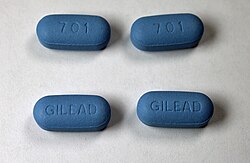Truvada
 |
|
 |
|
| Combination of | |
|---|---|
| Tenofovir disoproxil | Nucleotide analogue reverse transcriptase inhibitor |
| Emtricitabine | Nucleoside reverse transcriptase inhibitor |
| Clinical data | |
| Trade names | Truvada, other |
| AHFS/Drugs.com | Professional Drug Facts |
| Pregnancy category |
|
| Routes of administration |
by mouth |
| ATC code | |
| Legal status | |
| Legal status |
|
| Identifiers | |
| PubChem CID | |
| NIAID ChemDB | |
Emtricitabine/tenofovir, sold under the brand name Truvada among others, is a medication used to treat and prevent HIV/AIDS. It is a fixed-dose combination of two antiretroviral medications: tenofovir disoproxil and emtricitabine. For treatment it is used either alone or together with other antiretroviral medication. For prevention before exposure, in those who are at high risk, it is recommended with safe sex practices. It does not cure HIV/AIDS. Emtricitabine/tenofovir is taken by mouth.
Common side effects including headache, feeling tired, trouble sleeping, abdominal pain, weight loss, and rash. Serious side effects may include high blood lactate levels and enlargement of the liver. Use during pregnancy does not appear to harm the baby.
Emtricitabine/tenofovir was approved for medical use in the United States in 2004. It is on the World Health Organization's List of Essential Medicines, the most effective and safe medicines needed in a health system. The wholesale cost in the developing world is about 6.06 to 7.44 USD per month. In the United States, as of 2016, the wholesale cost is about 1415.00 USD per month.
Emtricitabine/tenofovir is used to both treat and to prevent HIV/AIDS.
In studies, tenofovir reduced the incidence of HIV infection, especially in high-risk individuals (by 42% in MSM), but produced conflicting results in other studies (notably the FEM-PrEP study in heterosexual African women). One study estimated through mathematical modeling that daily intake of could potentially achieve a 99% of risk reduction of contracting HIV in high-risk individuals. Another study showed overall PrEP effectiveness of 50% rising to 100% when participants took the drug four or more times per week. A Cochrane review found that both tenofovir alone, as well as the tenofovir/emtricitabine combination, decreased the risk of contracting HIV by 51%.
...
Wikipedia
